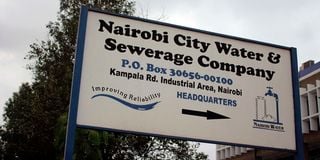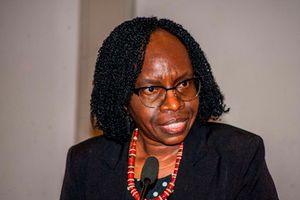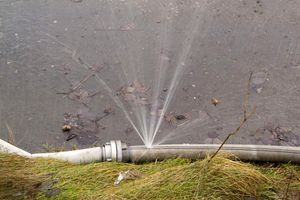
Some 15 county water companies lost up to Sh10.5 billion in water processed but not billed to customers.
Some 15 county water companies lost up to Sh10.5 billion in water processed but not billed to customers, a Senate report has revealed.
The damning report by the Senate County Public Investments and Special Funds Committee said illegal connections and leakages from dilapidated water infrastructure are at the heart of the high levels of non-revenue water.
It also emerged that some of the water firms did not maintain records of the volume of water produced, making it impossible to efficiently track their output.
While tabling the report before the Senate, the committee chairperson Godfrey Osotsi said the Nairobi City Water and Sewerage Company Limited recorded the highest non-revenue water, at Sh8.5 billion, during the financial year ending June 30, 2024.

The Nairobi City Water and Sewerage Company Limited.
Mombasa Water and Sanitation Company Limited followed with a loss of Sh1 billion; Kericho Water and Sanitation Company, Sh199.4 million; Kwale Water and Sewerage Company Limited, Sh183.3 million; Kitui Water and Sanitation Company, Sh110.1 million; and Sibo Water and Sanitation Company in Siaya, Sh102.7 million.
Others include Lodwar Water and Sanitation Company (Sh89.1 million), Bomet Water and Sanitation Company (Sh68.1 million), and Narok Water and Sewerage Services (Sh53.3 million).
Busia Water and Sewerage Company Limited failed to bill customers for up to 67 per cent of the water it produced, while Kirinyaga Water and Sanitation Company Limited generated no revenue from 60 per cent of its output in the financial year ending June 2021.
These percentages are significantly higher than the 25 per cent threshold set by the Water Services Regulatory Board (Wasreb).
For instance, Busia Water and Sewerage Company Limited produced 1.2 million cubic metres of water but accounted for only 402,028 cubic metres - just 33 per cent.

Senator Godfrey Osotsi, who is the chairperson Senate County Public Investment Committee.
Kirinyaga Water and Sanitation Company Limited produced 6.72 million cubic metres but only billed 2.7 million, leaving a balance of 4 million unbilled, resulting in a loss of Sh470.6 million.
“The water firms were unable to realise their full revenue potential due to the high rate of water loss through non-revenue water, low metering ratios - meaning a significant volume of water is consumed but not metered - outdated pricing models, and high operations and maintenance costs that fail to match the revenue generated,” said Senator Osotsi.
Iten-Tambach Water and Sewerage Company Limited produced one million cubic metres of water but only billed customers for 681,765 cubic metres, leaving 320,835 cubic metres (32 per cent) unbilled.
Migori Water and Sewerage Company Limited produced 481,921 cubic metres of water but only 249,801 cubic metres were billed, with 232,120 cubic metres - or 48 per cent - going unaccounted for, resulting in a loss of Sh13.89 million.
Nanyuki Water and Sanitation Company Limited produced 4.6 million cubic metres of water, of which 2.78 million were billed, leaving 1.87 million - approximately 40 per cent - valued at Sh12.6 million as non-revenue water.
Nithi Water and Sanitation Company Limited produced a total of 3.5 million cubic metres of water during the year under review, at a production cost of Sh3 per cubic metre. However, only 1.32 million cubic metres were billed, leaving 2.2 million - or approximately 62.6 per cent - unaccounted for, resulting in a loss of around Sh4 million.
Other water firms with excessive non-revenue water included Olkejuado Water and Sewerage Limited (Kajiado), Migori County Water and Sanitation Company Limited, Wote Water and Sewerage Company Limited (Makueni), Homa Bay Water and Sanitation (Homa Bay), Amatsi Water Services Company Limited (Vihiga), and Samburu Water and Sanitation Company Limited.
“For instance, during the year under review, Cherang’any Marakwet Water and Sanitation Company Limited neither installed a master meter nor provided meters to its clients,” said Mr Osotsi.
The committee now recommends that the board and accounting officers of the water companies put in place comprehensive measures to mitigate non-revenue water (both physical and commercial losses), including the use of Geographical Information Systems to receive real-time data.
This, the committee said, would help detect bursts and leakages, enable the installation of smart meters for accurate billing, facilitate the replacement of dilapidated infrastructure, and support the development of institutional anti-corruption policies and enforcement measures to prevent illegal connections, among other reforms.









